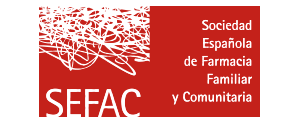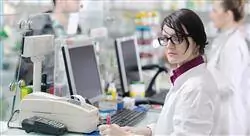University certificate
Scientific endorser

The world's largest faculty of pharmacy”
Introduction to the Program
Thanks to this Professional master’s degree, you will be able to keep abreast of scientific and technical advances in PPCS"
The World Health Organization (WHO) warned that 50% of chronic patients are abandoning therapeutic treatments. These high figures mean that patients visit the Emergency Departments more frequently. A panorama that can be reduced thanks to the daily work carried out by pharmacists in community pharmacies. In this way, the information they provide about treatments can improve the results of these treatments and even prevent the appearance of problems related to the drugs themselves.
All of this affects both the quality of care and the patient's own health. The professionals therefore have an active role to play, and in some cases even a determining factor in the physical and/or mental well-being of the person. This Professional master’s degree provides students with the latest knowledge on Professional Pharmaceutical Care Services in Community Pharmacy. For this purpose, TECH has assembled a team of professionals with extensive experience in the sector and versed in this subject.
The extensive knowledge of the faculty of this program is reflected in the syllabus, where students can learn more about the PPCS aimed at improving the process of use of medicines and medical devices, their assessment and the care provided by the pharmacist.
A 100% online Professional master’s degree that provides the professionals with the ease of being able to study it comfortably, wherever and whenever they want. You will only need an electronic device (computer, tablet or cell phone) with internet access to achieve the knowledge update you are looking for. It is also an ideal educational option for those who wish to obtain a university degree that is compatible with their professional and/or work responsibilities.
A 100% online education designed for professionals who wish to combine a university degree with other areas of their lives"
This Professional master’s degree in Professional Pharmaceutical Care Services in Community Pharmacy contains the most complete and up-to-date program on the market. The most important features of the program include:
- The development of practical cases presented by experts in Pharmacy
- The graphic, schematic, and practical contents with which they are created, provide scientific and practical information on the disciplines that are essential for professional practice
- Practical exercises where self-assessment can be used to improve learning
- Its special emphasis on innovative methodologies
- Theoretical lessons, questions to the expert, debate forums on controversial topics, and individual reflection assignments
- Content that is accessible from any fixed or portable device with an internet connection
This Professional master’s degree will allow you to learn everything from the advice on immunization in travelers to the appropriate results of drugs and medical devices”
The program’s teaching staff includes professionals from the sector who contribute their work experience to this training program, as well as renowned specialists from leading societies and prestigious universities.
The multimedia content, developed with the latest educational technology, will provide the professional with situated and contextual learning, i.e., a simulated environment that will provide immersive training programmed to train in real situations.
This program is designed around Problem-Based Learning, whereby the professional must try to solve the different professional practice situations that arise throughout the program. For this purpose, the student will be assisted by an innovative interactive video system created by renowned and experienced experts.
With a computer or a tablet you can comfortably connect to the campus where you have the complete syllabus of this university degree"
Delve in a much more agile way into procedures used in the adaptation of drugs to the patient's needs"
Why study at TECH?
TECH is the world’s largest online university. With an impressive catalog of more than 14,000 university programs available in 11 languages, it is positioned as a leader in employability, with a 99% job placement rate. In addition, it relies on an enormous faculty of more than 6,000 professors of the highest international renown.

Study at the world's largest online university and guarantee your professional success. The future starts at TECH”
The world’s best online university according to FORBES
The prestigious Forbes magazine, specialized in business and finance, has highlighted TECH as “the world's best online university” This is what they have recently stated in an article in their digital edition in which they echo the success story of this institution, “thanks to the academic offer it provides, the selection of its teaching staff, and an innovative learning method aimed at educating the professionals of the future”
A revolutionary study method, a cutting-edge faculty and a practical focus: the key to TECH's success.
The most complete study plans on the university scene
TECH offers the most complete study plans on the university scene, with syllabuses that cover fundamental concepts and, at the same time, the main scientific advances in their specific scientific areas. In addition, these programs are continuously being updated to guarantee students the academic vanguard and the most in-demand professional skills. In this way, the university's qualifications provide its graduates with a significant advantage to propel their careers to success.
TECH offers the most comprehensive and intensive study plans on the current university scene.
A world-class teaching staff
TECH's teaching staff is made up of more than 6,000 professors with the highest international recognition. Professors, researchers and top executives of multinational companies, including Isaiah Covington, performance coach of the Boston Celtics; Magda Romanska, principal investigator at Harvard MetaLAB; Ignacio Wistumba, chairman of the department of translational molecular pathology at MD Anderson Cancer Center; and D.W. Pine, creative director of TIME magazine, among others.
Internationally renowned experts, specialized in different branches of Health, Technology, Communication and Business, form part of the TECH faculty.
A unique learning method
TECH is the first university to use Relearning in all its programs. It is the best online learning methodology, accredited with international teaching quality certifications, provided by prestigious educational agencies. In addition, this disruptive educational model is complemented with the “Case Method”, thereby setting up a unique online teaching strategy. Innovative teaching resources are also implemented, including detailed videos, infographics and interactive summaries.
TECH combines Relearning and the Case Method in all its university programs to guarantee excellent theoretical and practical learning, studying whenever and wherever you want.
The world's largest online university
TECH is the world’s largest online university. We are the largest educational institution, with the best and widest online educational catalog, one hundred percent online and covering the vast majority of areas of knowledge. We offer a large selection of our own degrees and accredited online undergraduate and postgraduate degrees. In total, more than 14,000 university degrees, in eleven different languages, make us the largest educational largest in the world.
TECH has the world's most extensive catalog of academic and official programs, available in more than 11 languages.
Google Premier Partner
The American technology giant has awarded TECH the Google Google Premier Partner badge. This award, which is only available to 3% of the world's companies, highlights the efficient, flexible and tailored experience that this university provides to students. The recognition as a Google Premier Partner not only accredits the maximum rigor, performance and investment in TECH's digital infrastructures, but also places this university as one of the world's leading technology companies.
Google has positioned TECH in the top 3% of the world's most important technology companies by awarding it its Google Premier Partner badge.
The official online university of the NBA
TECH is the official online university of the NBA. Thanks to our agreement with the biggest league in basketball, we offer our students exclusive university programs, as well as a wide variety of educational resources focused on the business of the league and other areas of the sports industry. Each program is made up of a uniquely designed syllabus and features exceptional guest hosts: professionals with a distinguished sports background who will offer their expertise on the most relevant topics.
TECH has been selected by the NBA, the world's top basketball league, as its official online university.
The top-rated university by its students
Students have positioned TECH as the world's top-rated university on the main review websites, with a highest rating of 4.9 out of 5, obtained from more than 1,000 reviews. These results consolidate TECH as the benchmark university institution at an international level, reflecting the excellence and positive impact of its educational model.” reflecting the excellence and positive impact of its educational model.”
TECH is the world’s top-rated university by its students.
Leaders in employability
TECH has managed to become the leading university in employability. 99% of its students obtain jobs in the academic field they have studied, within one year of completing any of the university's programs. A similar number achieve immediate career enhancement. All this thanks to a study methodology that bases its effectiveness on the acquisition of practical skills, which are absolutely necessary for professional development.
99% of TECH graduates find a job within a year of completing their studies.
Professional Master's Degree in Professional Pharmaceutical Care Services in Community Pharmacy
Appropriate practices in pharmaceutical assistance have a positive impact on the health field, since they not only improve quality, but also contribute to the guarantee of public health. Taking into account that in TECH Global University one of our main objectives is the dynamic accompaniment in the processes of professional strengthening, we have created this Professional Master's Degree focused on the various forms of provision of pharmacotherapeutic information. Thanks to our comprehensive curriculum, students will address the current situation of pharmaceutical care in Spain and in other countries, where research is being carried out in the models of provision of this type of services. In addition, the indispensable aspects to understand the importance of the design, evaluation and monitoring of medicines are exposed. Secondly, a series of tools for the correct measurement of somatometric, physiological and biochemical parameters is offered. Finally, special emphasis is placed on the ethical and legal aspects that govern the practice, analyzing the role of advertising in the field of competitiveness.
Postgraduate course in Community Pharmacy - Professional Pharmaceutical Care Services
With this postgraduate course of TECH it is possible to develop, integrally, the necessary competences to face the current and future demands of health care in pharmacy. By going through each of the proposed thematic axes, students will be able to fully immerse themselves in the conceptualization and adoption of the Pharmaceutical Care model, as well as in the management of the pharmacotherapeutic monitoring and pharmacovigilance stages. All this, in order to optimize the operation of counseling and primary intervention services in the centers of their community. The Professional Master's Degree also offers specialized content in the planning of prevention and health promotion campaigns, environmental and food safety. At the end of the program, the graduate will be able to develop and implement programs that promote the centralization not only in medicines, but also in patient care. Due to this background, he/she will be characterized by being an experienced professional in the development of the processes of reorientation of pharmaceutical work and highly competent in meeting the demands of its users.









